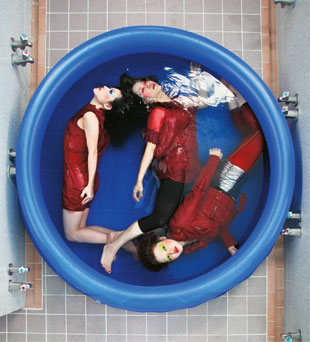
Originally published on metropolis.co.jp on May 2010

Photo by Kikuna Mishima
Writing about music, it’s been said, is like dancing about architecture.
This saying holds particularly true when applied to the music of Bo-Peep. The Tokyo trio’s guitar rock emerges out of a loudspeaker with the brute force of a shinkansen roaring out of a tunnel, and really has to be experienced live to be fully understood.
Frontwoman Mika Yoshimura, drummer Ryoko Nakano and bassist Kaori “Take” Takebayashi’s new album Vibe may come closest yet to approximating their kinetic performances. The album’s ferocity, in fact, emerged partly from an injury Yoshimura sustained during a gig last fall.
“I broke my ankle jumping off the stage,” she relates over dinner and beers at a Shibuya café. “I think the pain comes through in the music—but that’s not all there is to the album. It was also a lot of fun.”
Bo-Peep’s fifth full-length, Vibe launches with the crazed, AC/DC-on-estrogen riffs of “Power.” The song sets the stage for a compact, seven-song outing of cutting guitar licks and knotty, muscular rhythms courtesy of Nakano and Takebayashi.
Rooted in the riot grrrl wing of the ’90s alt-rock movement, the group’s sound has a heft to it that, paired with Yoshimara’s hysterical delivery, leaves listeners gasping for air. The lyrics are equally to-the-point. Consider, for example, the four-line song “She”: “She’s a liar and foolish/She is selfish and narrow-minded/I dislike her/What’s the meaning that you live for?”
“The song is about me,” Yoshimura admits. “A lot of my songs are autobiographical. And yes, I do dislike myself.”
The cover art for Vibe once again features the indelible images of photographer Kikuna Mishima, who after listening to the songs was inspired to create an image of slightly loony, half-drowned girls in a pool. Yet across the table, Bo-Peep are circumspect as they discuss the decade since forming in Fukuoka and their growing acclaim overseas.
“This is our third band together,” Nakano explains about her long partnership with Yoshimura. “We first played with a guy, but it wasn’t working out—not because he was male but due to personality issues. Then we started playing with [previous bassist] Hime. We had that lineup for seven years until she had her child.”
With Hime’s blessing, the band found itself a new bassist. “I loved them, but they were a bit scary at first,” Take says. “Especially when Mika is playing live: she didn’t seem like a good person. But when I met her she was so kind—except for when she gets drunk. Then she can still be a bit scary.”
Bo-Peep didn’t start out planning to be a female rock band per se. But at the same time, there was something they wanted to achieve that necessitated a female lineup.
“I’d always thought I didn’t want to do a ‘feminine’ band,” Yoshimura explains. “I wanted to do something that would subvert the ‘kawaii’ female Japanese image, and went for a heavy sound. But at the end of the day, even though we rock pretty hard, we are women and we do put on makeup.”
So is it true, as it sometimes seems, that there’s been a recent explosion of female Japanese rock bands?
“Japanese women used to stay at home, but are now out working and doing anything that men do—including playing in bands,” Nakano begins.
“There are a lot of young bands in their teens and 20s,” Take observes. “But the fact is as women get older, many get married and have kids, so the number goes down dramatically.”
Nakano notes that people may simply be seeing what they want to see.
“It partly has to do with perceptions from the mass media,” she says. “With the internet, overseas audiences are much more aware of what’s happening in Japan. If you Google ‘Japanese Girls Rock,’ you’ll get a lot of hits.”
“I think it’s the ability of the girl bands, rather than the number, that has grown,” Yoshimura adds, citing groups like prog-punk colossus Super Junky Monkey. “That makes them stand out in people’s minds.”
Ultimately, whether they’re playing for an American audience (as on their recent two-week tour of the US) or for Japanese fans at home, Bo-Peep’s goal is gender-free.
“We hope to express our entire selves through the music,” says Nakano, “to do something musical that is beyond gender categorization.”
Saiko vol. 6 “Rock Chick Returns”
Metropolis presents its latest live music showcase, with Bo-Peep, DadaD, Jonny, LAZYgunsBRISKY, Tim and Puma Mimi, and more. May 16, 6pm, ¥2,000. Marz, Shinjuku. Tel: 03-4550-2929.
Vibe is available on Flightpath Records.





